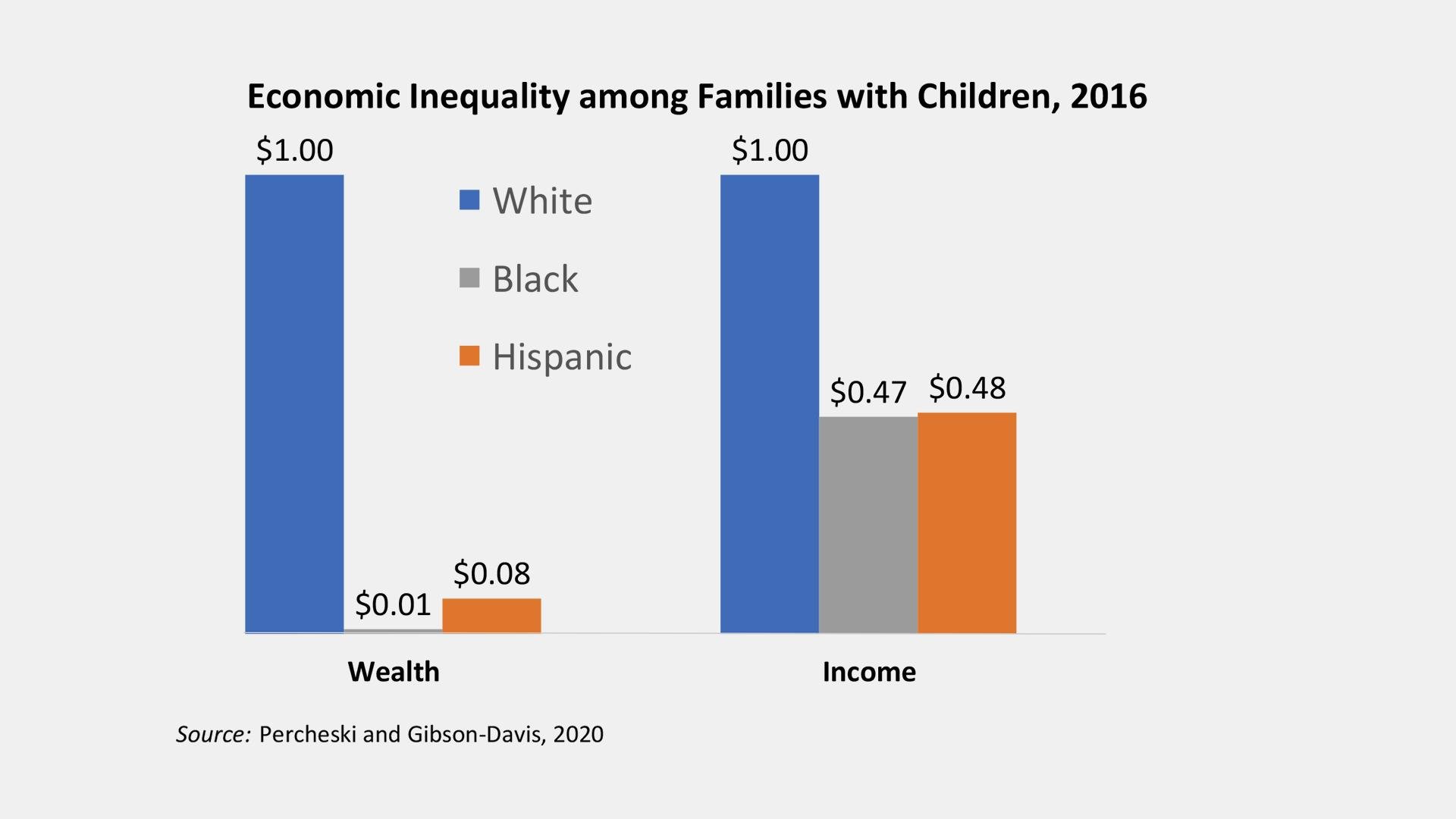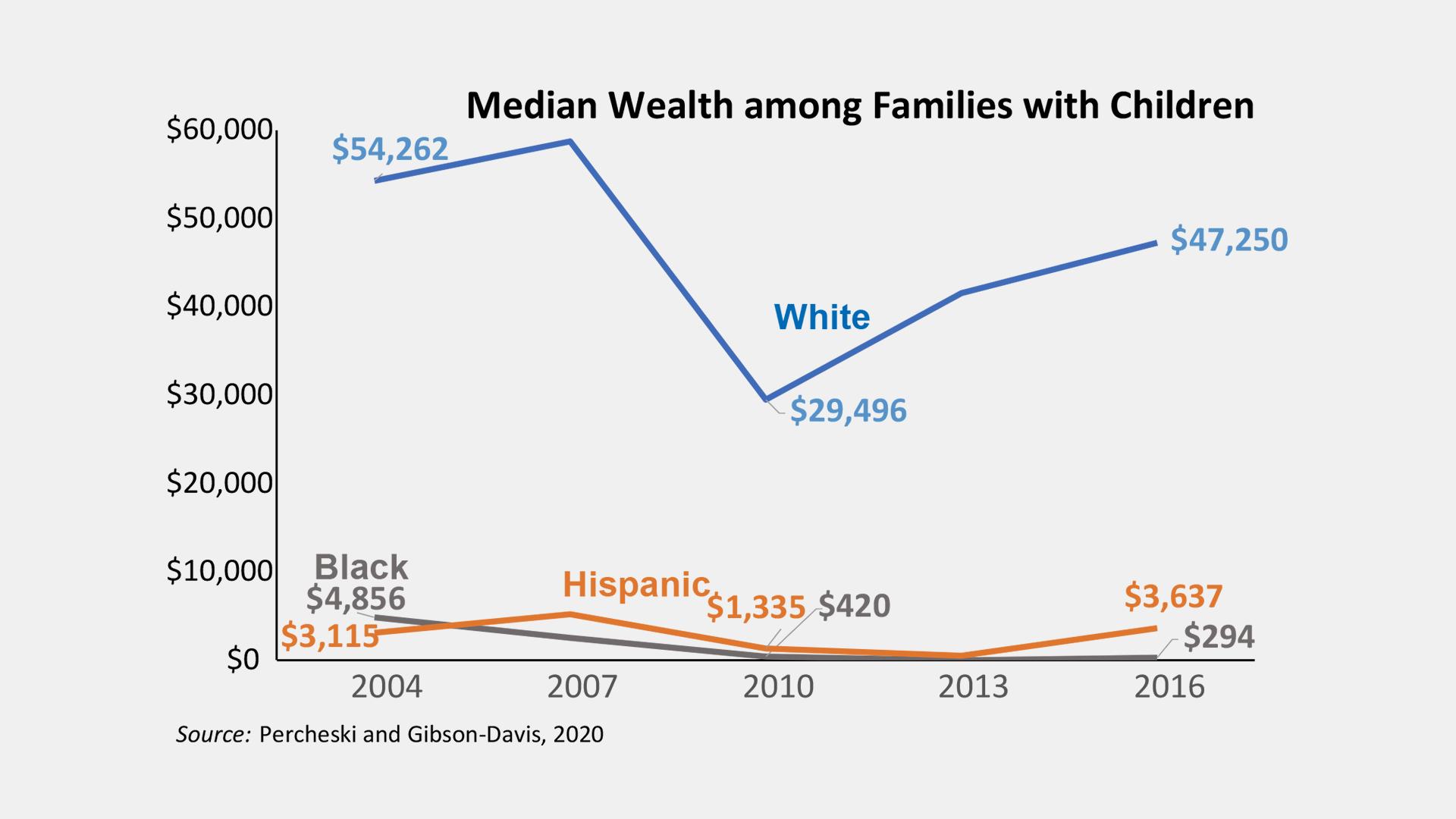On Average, African American Families Earn What Percentage of the Amount That White Families Earn?
For every one dollar of accumulated wealth that white families accept, black families accept just one cent.
That's the finding of a new report from Northwestern University which used data on consumer finances from the Federal Reserve to runway changes in family wealth from 2004 to 2016.
The report establish that Latino families fare slightly improve, with eight cents for every dollar.
 (Courtesy of Christine Percheski, Northwestern University)
(Courtesy of Christine Percheski, Northwestern University)
Northwestern University sociologist Christine Percheski, who co-authored the study, compared the wealth — avails minus debts — of households with children for black, white and Latino families, noting that a family'due south wealth is fundamental to a child'south futurity success.
"Racial inequality in income for families with children has not grown recently, merely racial wealth inequality has grown tremendously," Percheski said. "The level of racial economic inequality in the U.S. is staggeringly loftier, and that is an important part of the story of racial violence and racial injustice and health disparities of the COVID-xix pandemic."
Percheski points to discrimination in housing and mortgage lending, including predatory lending, as well every bit inequities in the way higher education is financed equally some of the contributory factors that take created the huge disparity in wealth between blackness and white families. She also notes that after the Peachy Recession of 2008, many white and Latino families were able to regain much of the wealth they lost. But that hasn't happened for black families who have seen a well-nigh 20% drop in homeownership since that time.
 (Courtesy of Christine Percheski, Northwestern University)
(Courtesy of Christine Percheski, Northwestern University)
"Racial economic inequality is an important part of the story of racial violence and racial injustice," Percheski said. "We absolutely need to call back virtually how nosotros can outset to reduce wealth inequality, and it's non going to be quick or easy, and it will require radical action."
Rendel Solomon, managing director with Muller & Monroe Asset Management — a Chicago-based private disinterestedness firm — knows much about the systematic denial of opportunities to generations of African Americans through his own family history. His grandmother moved to Chicago as part of the Keen Migration that saw many African Americans move from southern states to northern cities similar Chicago.
"The system that my grandmother lived in in Mississippi didn't beget her the opportunity to larn skills and understanding of how coin works," Solomon said. "She passed down all that she could laissez passer downwardly to my belatedly mother, who focused on didactics, recognizing how disquisitional that would be to any potential success that I might have in the future. So for me and my generation, I'm first generation higher and my two sisters — all 3 of us are college graduates — I felt it was incumbent on united states of america to push things even further."
Solomon says at that place's a constant conflict and boxing betwixt the notion of individual responsibility and systemic pressures which have held back economical evolution in the blackness customs.
"Those 2 things are in constant battle, and so when we talk about creating solutions both of those paths have to be addressed," he said. "In that location is mindset shift that has to happen on both sides of the equation and there are structural impediments that need to be addressed. And nosotros have to continue to reinforce the importance and significance of pedagogy to our customs."
He also notes that while calls for greater investment in blackness communities is seen by some equally a handout, they fail to have into account the theft of wealth from African Americans for generations — starting with slavery.
"In that location is an extraction of wealth that took identify and that was followed up by a deprival of opportunity — and the two piece of work together," said Solomon, who founded the nonprofit One Stock I Futurity to increase the fiscal literacy of disadvantaged youth through stock ownership. It's goal is to empower one meg young people from disadvantaged backgrounds past making them shareholders and exposing them to bones concepts related to ownership, coin management and investing.
He too wants to inspire entrepreneurship.
"In that location is $70 trillion of uppercase that flows down from institutional investors co-ordinate to a contempo Knight Foundation study and less than 1.5% of it is managed by firms that are owned by women and minorities combined," Solomon said. "We need to look deep inside the structures to look at who gets to manage that capital and invest that capital that goes to build businesses. We take to ask ourselves if that number was different could nosotros possibly come across different outcomes if there wasn't such a disparity in that menses of capital?"
Source: https://news.wttw.com/2020/06/10/study-black-families-have-1-cent-every-dollar-white-families-have
0 Response to "On Average, African American Families Earn What Percentage of the Amount That White Families Earn?"
Post a Comment